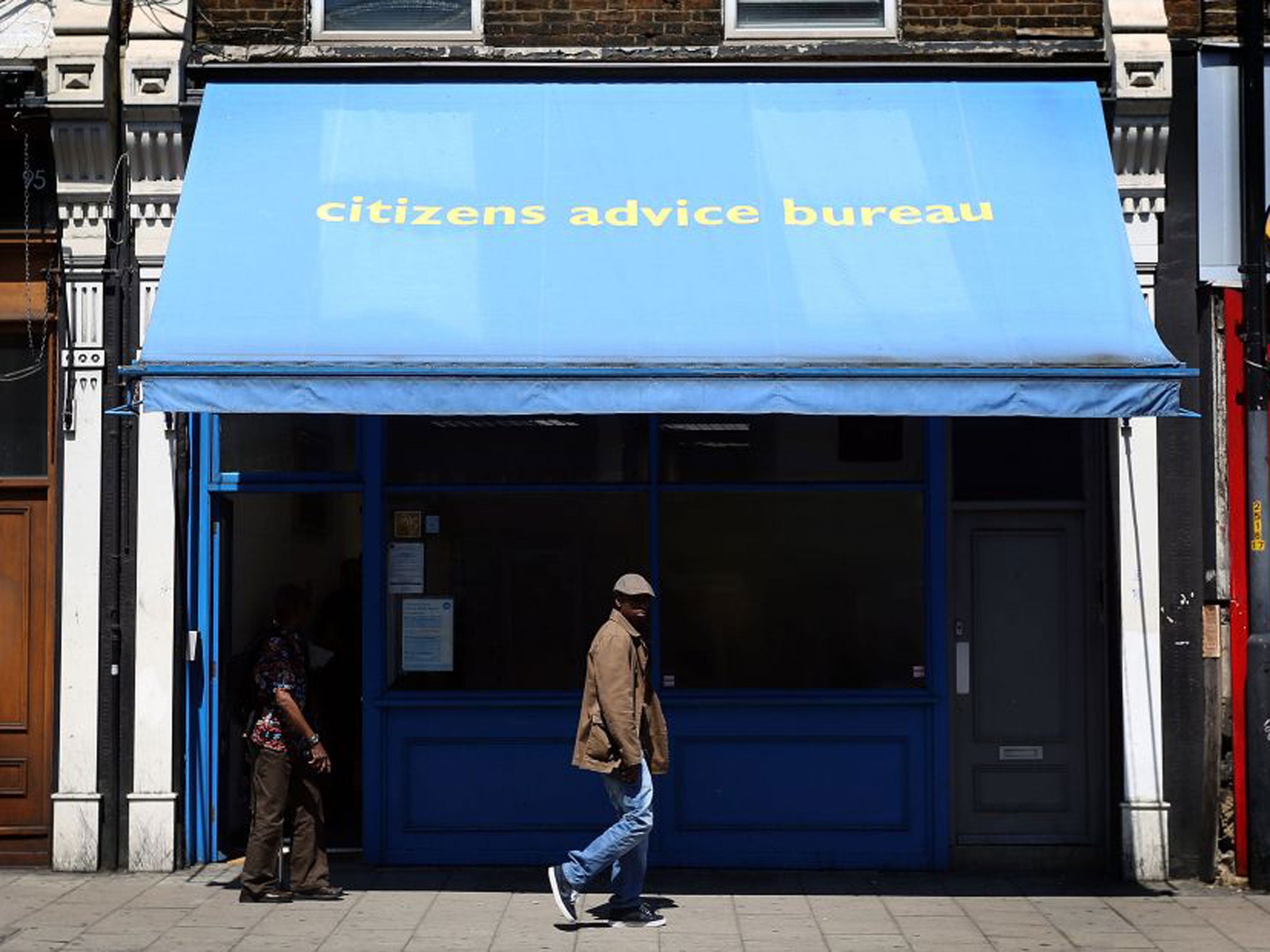'Soaring' numbers need urgent help from Citizens Advice Bureau after welfare changes 'drive people to despair'
Tougher sanctions and hardship payments for those on Jobseekers Allowance (JSA) prompted a 40 per cent rise in people seeking assistance

Your support helps us to tell the story
From reproductive rights to climate change to Big Tech, The Independent is on the ground when the story is developing. Whether it's investigating the financials of Elon Musk's pro-Trump PAC or producing our latest documentary, 'The A Word', which shines a light on the American women fighting for reproductive rights, we know how important it is to parse out the facts from the messaging.
At such a critical moment in US history, we need reporters on the ground. Your donation allows us to keep sending journalists to speak to both sides of the story.
The Independent is trusted by Americans across the entire political spectrum. And unlike many other quality news outlets, we choose not to lock Americans out of our reporting and analysis with paywalls. We believe quality journalism should be available to everyone, paid for by those who can afford it.
Your support makes all the difference.The number of people seeking urgent advice about benefits problems is soaring as vulnerable Britons are being “driven to despair” by Iain Duncan Smith’s welfare reforms.
Citizens Advice has seen a surge in the number people asking for help to navigate a “blizzard” of benefit changes in England and Wales, figures given exclusively to The Independent show.
Tougher sanctions and hardship payments for those on Jobseekers Allowance (JSA) prompted a 40 per cent rise in people seeking assistance in the year to March. There has also been a 50 per cent jump in the numbers approaching the charity for help with the controversial sickness benefit, the Employment Support Allowance (ESA), with 458,000 problems reported to the service.
Too many people are having their benefits stopped “because they don’t understand what is required of them”, according to Gillian Guy, CAB’s chief executive.
She said: “Wrongly applied sanctions move jobseekers further away from the job market, undermining government efforts to increase growth in the UK’s ailing economy by getting more people off benefit and into work. There is no evidence to show what is gained from stopping people’s benefits for a month. What is clear is the hardship it causes.”
The introduction of more punitive sanctions for jobseekers in October 2012 means that now just missing an appointment can leave welfare claimants with no benefits for a month. In the first three months of this year alone, some 3,000 people needed help with sanctions.
The use of sanctions has fuelled a rise in people using food banks. In April 2012, south London’s Southwark CABs issued 120 food vouchers; in April 2013 they issued 500.
Shadow Department for Work and Pensions (DWP) minister Liam Byrne said: “These shocking figures are fresh evidence the Government’s so-called welfare revolution isn’t helping people into work, it’s driving people into despair. We can’t go on like this. As Ed Miliband set out this week, we need to reform social security to bring the long-term costs under control – and that starts by helping people into work, not forcing them to food banks.”
Social landlord rent arrears are also a growing problem, with 80,000 people seeking help. Inquiries about discretionary housing payments soared by 88 per cent between January and March this year, compared with the same quarter last year, to 2,924.
The charity says that the worst is yet to come, with the benefit cap on the way in the autumn, when many larger families could see paltry incomes further chiselled away. Ms Guy said: “Demand for advice is higher than ever and with welfare reform underway, we expect to see an unprecedented rise in the number of people turning to Citizens Advice for support.”
Despite the organisation operating with three-quarters of last year’s budget, it still dealt with 2.3 million new approaches for help in the year to March 2013 – up 2 per cent from 2011/12.
A DWP spokeswoman said: “We expect people to have questions about benefit reforms, and that’s why we’ve communicated the changes early on and explained to people how they will be affected. For example, we began writing to people who would be impacted by the benefit cap one year before the cap comes in, to let people know about the support available to them and explain their options.”
Join our commenting forum
Join thought-provoking conversations, follow other Independent readers and see their replies
Comments